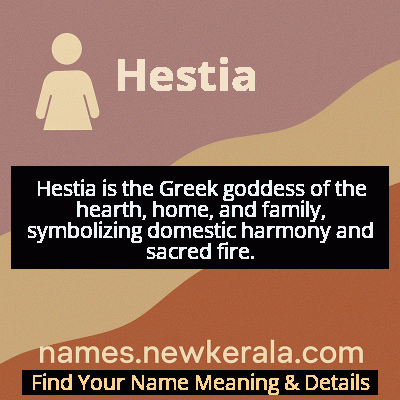Hestia Name Meaning & Details
Origin, Popularity, Numerology Analysis & Name Meaning of Hestia
Discover the origin, meaning, and cultural significance of the name HESTIA. Delve into its historical roots and explore the lasting impact it has had on communities and traditions.
Name
Hestia
Gender
Female
Origin
Greek
Lucky Number
8
Meaning of the Name - Hestia
Hestia is the Greek goddess of the hearth, home, and family, symbolizing domestic harmony and sacred fire.
Hestia - Complete Numerology Analysis
Your Numerology Number
Based on Pythagorean Numerology System
Ruling Planet
Saturn
Positive Nature
Ambitious, efficient, realistic, and authoritative.
Negative Traits
Materialistic, stressed, confrontational, and can be overly ambitious.
Lucky Colours
Dark blue, black.
Lucky Days
Saturday.
Lucky Stones
Blue sapphire, amethyst.
Harmony Numbers
2, 4, 6.
Best Suited Professions
Business leaders, managers, financial services, law enforcement.
What People Like About You
Leadership, determination, organizational skills.
Famous People Named Hestia
Hestia Evans
Author
Created comprehensive mythology reference works in the 19th century
Hestia T. Chambers
Social Reformer
Pioneered women's welfare programs and domestic worker protections
Hestia T. Roman
Archaeologist
Significant contributions to understanding ancient Greek domestic life
Name Variations & International Equivalents
Click on blue names to explore their detailed meanings. Gray names with will be available soon.
Cultural & Historical Significance
In Roman culture, her counterpart Vesta became even more institutionally significant with the establishment of the Vestal Virgins, priestesses who maintained Vesta's sacred flame in Rome. The extinction of this flame was considered an omen of disaster for the state. This cultural importance reflects how ancient societies understood that domestic stability formed the bedrock of political and social order. Even today, Hestia's legacy continues in modern concepts of hospitality, the psychological importance of 'home,' and the recognition that nurturing domestic spaces contributes to individual and collective well-being.
Extended Personality Analysis
The name Hestia evokes personality traits centered around warmth, stability, and nurturing qualities. Individuals with this name often demonstrate exceptional emotional intelligence and a natural ability to create harmonious environments. They tend to be the 'glue' in relationships and organizations - reliable, consistent, and deeply committed to the well-being of others. Their strength lies in their quiet perseverance and ability to maintain calm during crises. Unlike more flamboyant personalities, Hestias typically work behind the scenes, ensuring that foundations remain solid and everyone feels cared for.
These individuals often possess strong intuitive abilities regarding others' emotional needs and excel in caregiving professions, education, or any field requiring patience and empathy. They value tradition and continuity while being adaptable to necessary changes. While they may appear reserved initially, Hestias form deep, lasting bonds and are fiercely protective of their loved ones. Their personal spaces often reflect their inner nature - organized, welcoming, and filled with meaningful objects that tell stories of family and connection. They find fulfillment in service to others and derive satisfaction from creating environments where people can thrive emotionally and spiritually.
Modern Usage & Popularity
In contemporary naming practices, Hestia occupies an interesting niche as a mythological name that combines classical gravitas with warm, domestic associations. While not among the most popular names, it has maintained a steady presence, particularly among parents with interests in classical education, mythology, or seeking names with strong feminine energy without being overtly floral or frilly. The name saw a noticeable uptick in the early 21st century coinciding with renewed interest in mythological names through popular book series and films. It's particularly favored by parents who value the name's connection to home, family, and stability in an increasingly fragmented world. Modern Hestias often appreciate their name's uniqueness while enjoying its positive, nurturing connotations. The name works well internationally and across various cultural backgrounds, though its classical Greek origins remain prominent. Its usage reflects a growing appreciation for names with historical depth and meaningful symbolism rather than purely aesthetic considerations.
Symbolic & Spiritual Meanings
Hestia's symbolic meanings extend far beyond her literal association with the hearth fire. She represents the sacred center - both the physical center of the home and the spiritual center within each person. The eternal flame symbolizes consciousness, the life force, and the unbroken continuity of existence. In psychological terms, Hestia embodies the archetype of inner centeredness and the importance of creating sacred space in one's life for reflection and authenticity. Her circular symbolism (the round hearth) represents wholeness, completion, and the cyclical nature of life's journeys.
Metaphorically, Hestia teaches the value of 'staying by the fire' - the importance of roots, tradition, and the quiet work of maintaining what matters most. In a world often focused on external achievement and constant movement, Hestia symbolizes the counterbalance of inner peace, domestic harmony, and the profound power found in stillness. Her symbolism reminds us that true security comes not from accumulating possessions but from cultivating warm relationships and meaningful rituals. The hearth represents the transformation of raw elements (wood) into sustaining energy (heat, light), mirroring how we transform life experiences into wisdom and how families transform individuals into communities.

